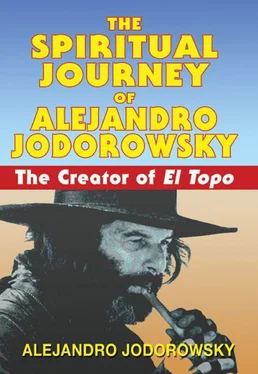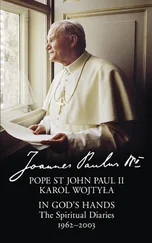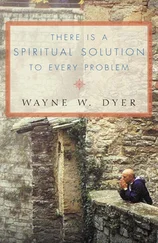“Ejo, I now see that when the Tigress gave me this valuable gold ring, she was saying that popular art is also noble.”
When he heard these words, he exclaimed: “Give it to the first beggar you meet!” And shouting “Kwatsu!” again, he gave me six blows.
Then we had a frugal lunch together and meditated for two hours. Afterward, he had me read a new koan: “Joshu visited a hermit. He asked the master: ‘Is there? Is there?’ The master raised a fist. Joshu said: ‘In these shallow waters, I do not wish to anchor my boat,’ and left. Then he visited another hermit and repeated the same question. This master also lifted his fist. Joshu said: ‘He can give, he can take, he can kill and yet give life!’ And he bowed. Commentary: The same tree shaken by the spring wind shows two aspects: warm branches on its southern side, cold branches on its northern side.”
Ejo crossed his legs and resumed his meditation. I did likewise. An hour passed. Then two hours, three hours. . no matter how I turned around the koan in my mind, I could not understand it. The silence lay on my shoulders like an elephant. An agonizing pain stiffened my legs. A fly settled into the hollow of my ear. I bore its flutterings without moving. A voice resounded in my skull: “Understand, or die!” As if he had also heard it, Ejo cried out three times: “Is there? Is there? Is there?”
I heard myself answer: “If there is not here, then where? If there is not now, then when? If there is not I, then who?”
Suddenly, I am Joshu. I walk up a steep path toward the distant hermitage. There are monks there, far from the noise of the world, involved in discovering the luminous jewel buried in the depths of the soul. They sit around an old master. He is a realized being — meaning he is himself and not a simulacrum of another. When he hears my triple question, the master (who has already crossed the border where words dissolve into emptiness) lifts a fist to show his present unity. If he is not fully here, he is nowhere. Yet his gesture does not convince me. I find it superficial. In spite of my advanced age (probably more than one hundred years) I climb another hill painfully. Why this extreme effort? I need to be convinced that I am not the only one, that my awakening is not an abnormal phenomenon, that the end of all paths is the same. In the second hermitage, the master also lifts his fist in response to my three cries. And at that moment, in spite of their responses being the same, I recognize myself in the old man before me. The jewel buried in the darkness of our soul can give, can take, can kill, and nevertheless can bestow upon us its own life, which is impersonal and eternal.
“Ejo, if Joshu preferred one place over the other, it was not because there was a difference between the two fists. The difference was in his own seeing. We always have a personal interpretation of other beings, things, and events. Perhaps Joshu perceived no authentic expression of unity in the gesture of the first master. Perhaps he felt that the latter was saying that he would never let go of his realization and that it was only for him. He may even have perceived that he was being rebuked as an intruder, presumptuously questioning a master right in front of his disciples, whom he protected as a hen defends her chicks. If they were to lose faith in him, they would crumble. The fist was actually a physical threat telling him to be gone. With his closed fist, this egoist can hold only a few grains of sand, but if he had opened it, all the sands of the desert would have passed through it. . In contrast, Joshu interpreted the same gesture of the second master in a completely opposite way — as a warning of what not to do: If my awakening is mine alone, then it is not mine. What belongs to me can be mine only when it is also for others.”
Ejo tilted his head to the right, tilted his head to the left, took a deep breath of the evening air, and let out a long sigh. He clucked his tongue softly several times as if comforting a hurt child. “Some branches are warmed by the sun, others cooled by the spring wind, but they are all part of the same tree. The two masters gave the same answer. They had realized the same emptiness, but with the first, Joshu felt cold from the spring wind; with the second, he felt the warmth of the sun. If all the branches are fed by the same roots, why go from one master to another, from one magical woman to another? When will you realize that others cannot give you what you already have in yourself? As long as you do not find this treasure in yourself, you will continue to project your doubts onto others. One day, the ring will be a curse, another day it will be a noble work of art. You will say that the skull symbolizes death or you will say that it symbolizes eternity — but the beggar you give it to will see only its monetary value.”
I felt wounded. I groaned with irony: “Thank you so much, don Ejo. At last I understand: in order to awaken, I must become a beggar, stripping myself of my personal anxieties in order to attain poverty of spirit, transforming myself into an empty bowl and waiting patiently for my essential being, the great Buddha, to grant me the alms of awakening!”
Shouting “Kwatsu!” in a more piercing voice than ever, the Japanese first made me prostrate with my forehead on the ground. Then he administered a flurry of thirty blows of the stick.
When he had finished, he said: “The wisdom of the master depends on your own capacity to use it to find yourself.” After this, he recited a Mexican proverb as if it were a holy sutra: “He who has the most saliva eats the most pinole . *13
Still feeling hurt, I countered with another Mexican proverb: “You can’t eat pinole and whistle at the same time.”
He laughed heartily, rubbing his belly. “Exactly! Each thing in its own time.”
Then he went to the kitchen and soon returned with plates of rice, fried sardines, and a thermos full of bitter, steaming tea. Between bites, he confided to me: “Mumon Yamada gave me a koan. I was never able to resolve it, but you — you can probably do it.”
Seeing a mischievous glint in his slanted eyes, I sensed a trap. Probably the koan he was going to give me was meaningless. What is the meaning of life? Life has neither meaning nor meaninglessness. It must be lived!
“Tokusan was the head teacher of a Zen monastery. Seppo was the chief administrator. †14One day, breakfast was late. Tokusan, bowl in hand, went into the dining hall. Seppo said to him: ‘I have not heard the bell ring for breakfast, and the gong has not been sounded either. What are you doing here with that bowl?’ Without a word, Tokusan bowed and returned to his cell. Seppo then remarked to another monk: ‘Tokusan may be great, but he has not understood the last verse.’”
As a sort of commentary, Ejo began to hum very softly: “The wind has blown the clouds away. Now the moon shines on the green hills like a coin of white jade.”
I began to reflect. If Tokusan is really a master, he cannot behave as a senile old man, and if Seppo is an awakened sage, he cannot speak of Tokusan with condescension. Tokusan did not simply wander into the dining hall out of blind habit. He was fully aware that the breakfast bell had not rung. When Seppo seemingly rebuked the master’s unconsciousness, Tokusan’s bow was not an acknowledgment of his forgetfulness. Between these two masters there could have been only profound respect, not some trivial competition between administrator and teacher. When Tokusan went to the dining hall, he knew that Seppo would be there, hurrying his monks to prepare breakfast, because it was late. Without a word, he held out his empty bowl to the administrator, saying: “The vicissitudes of life do not affect the peace of my spirit. Are you trying to accomplish a perfect work? If so, you are mistaken. For human beings, perfection is not possible, though excellence is. Simply do your work the best you can, accepting the inevitable errors.” Seppo understood. His own rebuke was very different from what it seemed to be: “Having realized emptiness, do you wish to show the way to those whom you believe are still in darkness? So many years of meditation, and still you hold an empty bowl in your hands. Your great flaw is the power of knowing your own mind and nature. Beware of your vanity; your bowl contains a thorn.”
Читать дальше












